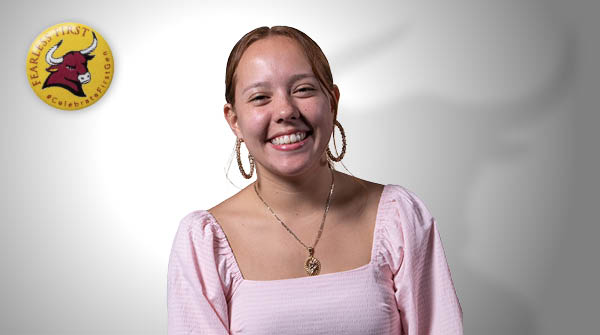Senior nursing student looks forward to providing quality medical care to underserved populations
For first-generation college student Genavee Gonzales, the first barrier to overcome was talking about higher education. “I was raised by my grandparents who weren’t able to finish high school. They love me so much and support my dreams in every way they can, but college was never really talked about in our household growing up. They didn’t know how to start the conversation or how to get the process started,” Gonzales said. “I'm so grateful for Dale Angleton. He worked for our school district helping high schoolers find scholarship opportunities and apply for them. He was the first person who made me feel like college was possible for me and he brought me here to tour CMU. We now consider him family.”
“I remember being so nervous before my scholarship interviews and Dale would say, ‘don’t be nervous! These people want to help you! You deserve to go to college, and you can do it!’” Gonzales said.
Once she arrived at CMU and started her studies, Gonzales had another barrier to overcome. “I'm the oldest of all of my siblings and in Latino households especially, girls are expected to be very independent, very strong and so it was difficult for me to know that it was okay to ask for help,” she said. Support from the TRIO staff and the sense of community with peers that have similar backgrounds made Gonzales feel comfortable asking questions and getting the help that she needed.
TRIO Student Support Services is a federally funded program offering workshops, individualized attention and mentoring to assist first-generation, low-income and disabled students achieve their academic, personal, financial and professional goals.
Gonzales is the Communications Director of CMU’s Cultural Inclusion Council and works on campus as a Resident Assistant. She is a senior in Colorado Mesa University’s Nursing Program. “I've always loved science. So, my first major was cellular, molecular and developmental biology. It was science, but not what I wanted to do,” Gonzales said. “I realized that I had a passion for helping people, specifically the low-income and minority population. I learned that nurses spend the most time with patients and know the most about them. I like that hands-on, face-to-face aspect of nursing.”
As a child, Gonzales accompanied her family members to medical appointments and saw them treated as though they were unintelligent or unworthy of proper care because of their thick accents or citizenship status. “I think that is the biggest reason I went into nursing,” Gonzales said. “No one’s language or culture should be a barrier to receiving care. I want my patients to know they are safe and not judged.”
Gonzales thought she would like to work in the Emergency Room but her last rotation of clinicals has changed her mind. “I just finished my capstone course in labor and delivery at St. Mary's Hospital, and I helped deliver 12 babies this summer. I love working in labor and delivery, helping to comfort mothers and bring their babies into the world. It is very specific, so I’d like to grow my skills in other areas first, like telemetry and surgery, but labor and delivery is definitely where I want to end up,” Gonzales said.
She said she is grateful for the opportunity to come to college and will pay it forward whenever possible, sharing all she has learned with her family and community about getting into college and navigating to graduation. “Being a first-generation student isn’t a setback, it’s a chance to show others what is possible and point them to the resources that were available to you,” Gonzales said.
